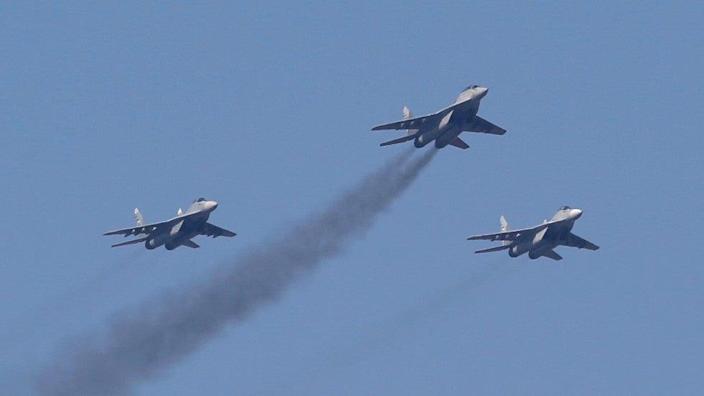
Republican senators grilled intelligence officials on Thursday for not supporting Poland’s plan to send fighter jets to Ukraine, claiming the United States was bowing to threats from Russian President Vladimir Putin.
At a Senate Intelligence Committee hearing on global threats, Sen. Tom Cotton (R-Ark.) blasted U.S. officials for “failing to help Poland,” which on Tuesday offered to send MiG-29 fighter jets to a base in Germany for deployment to Ukraine, with the U.S. then providing fighter jets to Poland to resupply its military.
The White House ultimately rejected that proposal, warning it could be viewed as an escalatory action in Putin’s eyes that could trigger a larger conflict between NATO and Russia.
Cotton asked why Putin “might be A-okay with us transferring missiles that turn their tanks into burning piles of rubbish or shoot their jets out of the sky, yet transferring tactical aircraft is considered unacceptable?”
“I don’t think there’s a lot of common sense between the distinction,” he added.
Ukraine has begged NATO for fighter jets as it fights off a brutal Russian invasion on the ground and in the air, pleas that have won limited support in Washington over escalation fears.
After Poland’s offer on Tuesday, Defense Secretary Lloyd Austin told Polish officials he does not support the transfer of the MiG-29 jets “at this time” because it was high-risk, according to his press secretary.
Lt. Gen. Scott Berrier, director of the Defense Intelligence Agency, repeated to lawmakers Thursday that there was an “escalation ladder” and Putin would view the transfer of fighter jets to Ukraine as an escalation.
Director of National Intelligence Avril Haines told the committee the decision to nix the transfer of the fighter jets was also based on the perception of Putin.
“It’s whether or not they perceive us as being in conflict with them,” Haines said. “We’re in a very challenging position right now where we are obviously providing enormous amounts of support to Ukraine … but at the same time, trying not to escalate the conflict into a full-on NATO or U.S. war with Russia.”
Although the U.S. has resisted calls for a no-fly zone, it has provided $1 billion to help Ukraine’s military over the past year – including Stinger anti-aircraft missile defense systems and Javelin anti-tank missiles.
The House on Thursday approved an additional $14 billion in humanitarian and military aid to Ukraine as part of an omnibus spending package that now heads to the Senate.
Sen. Ben Sasse (R-Neb.) on Thursday said the Biden administration should be “doing more” to help Ukrainians.
“There’s a war going on and [Ukrainian President Volodymyr] Zelensky is a hero on behalf of 44 million Ukrainians,” the senator said. “He’s asking for more help and the administration should be doing more faster.”




